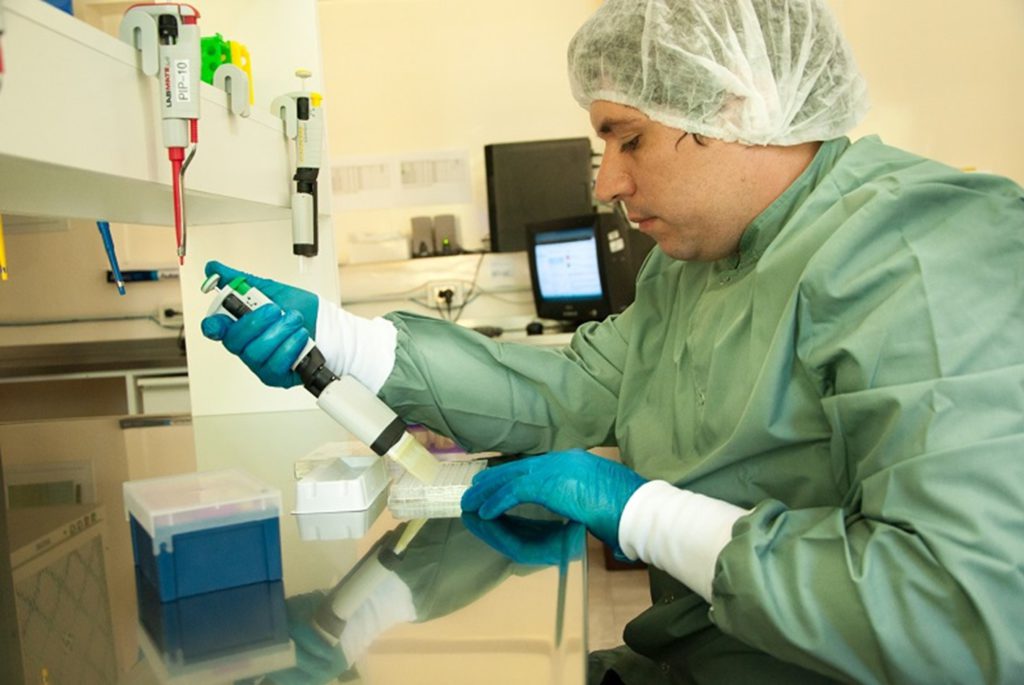Bioinnovo will increase production of the vaccine against Bovine Viral Diarrhea Virus
Por admin en UncategorizedBioinnovo, a public-private partnership between INTA and Vetanco S.A., will allocate an important support, granted by the Ministry of Productive Development, to increase the production of Vedevax Block in order to meet local demand and open new international markets.
This is the first subunit vaccine addressed to the immune system against Bovine Viral Diarrhea Virus (BVDV) used with excellent results and now looking for expansion into worldwide markets.
The support granted by the Ministry of Productive Development will be applied by Bioinnovo to enhance productivity also. The ceremony took place in Hurlingham with the attendance of Ariel Schale, Secretary of Industry; Juan Zabaleta, Mayor of Hurlingham; Tomas Schlichter, Vice-president of INTA, an agency of the Ministry of Agriculture, Livestock and Fisheries of Argentina; and representatives of Bioinnovo S.A., among others.
In this way, the public-private company will be able to “gain competitiveness in the cattle vaccines market”, explained Andrés Wigdorovitz, Director of Bioinnovo S.A. The funds will serve the purpose of “increasing production capacity and supplying the local and international markets”, he added.
Furthermore, “starting in 2021, Vedevax Block applications will be submitted gradually in key destinations outside Latin America, that has been until now our initial objective”, stressed Jorge Winokur, president of Vetanco S.A. Serving the national demand and opening new markets “demands increasing production capacity, and, in order to attain this goal we need to acquire equipment and hire new scientists”, he added.

The formal granting of the contribution took place at the Hurlingham Municipal House, with the attendance of local and institutional authorities and representatives of the company.
The investment projected by Bioinnovo includes the incorporation of personnel and technology to attain a production volume growth close to 100%.
“Opening new markets for Vedevax Block will result in more available capital that will be reinvested in research and development for the medium and long term”, stated Wigdorovitz.
During this first phase “we worked for a regional objective, that is a cattle stock of 100 million cows”, added Winokur.
The next target will be markets with a heard size at least like our is Argentina, starting with South Africa.
The Vedevax Block vaccine developed by the national scientific system was launched in 2018 to offer solutions against a complex worldwide impact problem that affects 90% of farms.
In Argentina, Bovine Viral Diarrhea causes losses amounting to 100 million US dollars a year, and in Mercosur, according to estimations made by the company losses are approximately 500 million US dollars a year. This is due to the fact that the disease causes a significant number of deaths and abortions in cows.

The bovine viral diarrhea virus is worldwide spread and affects cattle of all breeds and in all phases of development.
A vaccine with proven effectiveness
Vedevax Block has a positive impact on the national economic activity at two levels. On one hand, has proven to be effective to control the BVD virus, thus permitting to increase the production of calves, beef and milk, benefiting an industry that supplies international markets. On the other hand, its commercial growth abroad will increase more monetary income to the country through a high value-added product.
The vaccine formulation contains a molecule with the capacity to target the viral antigen to the antigen-presenting cells in the immune system, thus increasing the immune response in vaccinated animals. The targeted vaccine protects cattle for twelve months.
The bovine viral diarrhea virus is present all over the world and affects cattle of all breeds, in all phases of development. It impacts the reproductive rate since it is the leading cause of temporary infertility, embryonic resorption and abortion in all stages.
Reproductive rate is the factor with the greatest economic impact in breeding herds and one of the most important in dairy farms, since a cow needs to get pregnant and calve to produce milk. In turn, this virus has a great impact on the bovine respiratory complex, the disease that causes the most losses in fattening herds.


No Comment